Related Research Articles

The Alexander Valley is a Californian American Viticultural Area (AVA) just north of Healdsburg in Sonoma County. It is home to many wineries and vineyards, as well as the city of Cloverdale. It is the largest and most fully planted wine region in Sonoma. Highway 101 runs through the valley, and the Russian River flows down the valley, surrounded by vineyards on both sides. From the higher elevations of the valley rim, there is a view as far south as Taylor Mountain and Sonoma Mountain. The region was named for Cyrus Alexander, owner of a part of the Rancho Sotoyome Mexican land grant, in 1847. Granted AVA status in 1984, the boundaries of the appellation are defined in the Code of Federal Regulations, Title 27, Section 9.53.
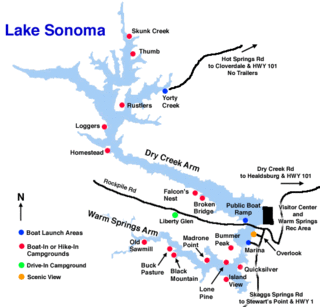
Rockpile AVA is an American Viticultural Area located in Sonoma County, California, northwest of the town of Healdsburg, on the hills above the west shore of Lake Sonoma in the southern Mendocino Range. Established on February 28, 2002, Rockpile AVA was Sonoma County's twelfth designated wine appellation. The wine region consists of approximately 15,400 acres (62 km2) in northwestern Sonoma County. All of the AVA has an elevation in excess of 800 feet (244 m) above sea level. Eleven vineyards are currently located within the AVA and there are approximately 160 acres (1 km2) of planted wine grapes.
Knights Valley AVA is an American Viticultural Area (AVA) in Sonoma County, California. One of Sonoma County's original five AVAs, Knights Valley AVA was formally designated an American Viticultural Area on October 21, 1983. Knights Valley AVA includes approximately 37,000 acres (150 km2). Over 30 growers maintain the 2,000 acres (8 km2) planted to wine grape vineyards. The easternmost designated Sonoma County wine region, Knights Valley AVA has the warmest climate in the county. The valley lies between the Alexander Valley AVA and Chalk Hill AVA wine regions to the west and the Mayacamas Mountains to the east. Geographically, the appellation separates the rest of Sonoma County from the Napa Valley AVA.
Guenoc Valley is an American Viticultural Area in Lake County, California, United States, about 15 mi (24 km) north of the town of Calistoga. Guenoc Valley AVA was the first American Viticultural Area designation granted to an area with just a single winery.
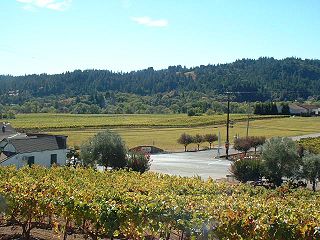
Sonoma County wine is wine made in Sonoma County, California, in the United States.
The Bennett Valley AVA is an American Viticultural Area located in Sonoma County, California. The boundaries of this appellation lie completely within the North Coast AVA, almost completely within the Sonoma Valley AVA and overlaps into some areas of the Sonoma Coast AVA and Sonoma Mountain AVA. The region was granted AVA status on December 23, 2003 following the petition of Matanzas Creek Winery. The AVA is surrounded to the south, east and west by the Sonoma Mountains and to the north by the city of Santa Rosa, California. The region receives a moderating effect on its climate from Pacific Ocean through the cool coastal fogs and breeze that creep into the area from the southwest through Crane Canyon between Sonoma Mountain and Taylor Mountain. Barbera, Cabernet Sauvignon, Cabernet Franc, Chardonnay, Grenache, Merlot, Pinot noir, Sauvignon blanc and Syrah are the leading grape varieties planted.
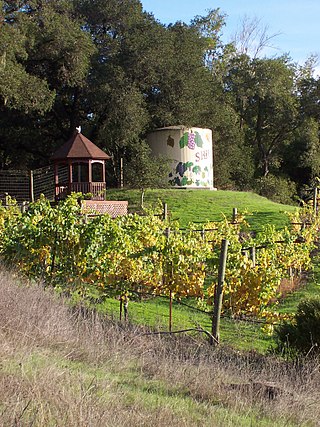
The Chalk Hill AVA is an American Viticultural Area (AVA) located in Sonoma County, California. The boundaries of the wine appellation cover the northeast corner of the Russian River Valley AVA. The majority of vineyards are located to the east of U.S. Route 101, near the town of Windsor. The name Chalk Hill comes from the unique volcanic soil of chalky white ash which has shown itself to perform well with planting of white wine varietals like Chardonnay and Sauvignon blanc. The majority of the region's wineries are located on the western slopes of the Mayacamas Mountains.

The Dry Creek Valley AVA is an American Viticultural Area in Sonoma County, California, located northwest of the town of Healdsburg. The valley is formed by Dry Creek, a tributary of the Russian River, and is approximately 16 miles (25.7 km) long and 2 miles (3.2 km) wide. The appellation benefits from the proximity of the Lake Sonoma reservoir for irrigation in this relatively dry area.
The Green Valley of Russian River Valley AVA is an American Viticultural Area in Sonoma County, California, United States. Located at the southwestern corner of the Russian River Valley AVA, its close proximity to the Pacific Ocean makes it one of the coolest appellations within Sonoma County. The climate in the Green Valley is even cooler than other parts of the Russian River Valley, and favors the cultivation of cool climate varietals like Pinot noir, Chardonnay and Gewürztraminer.
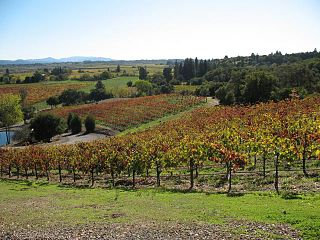
The North Coast AVA is an American Viticultural Area in the state of California that encompasses grape-growing regions in six counties located north of San Francisco: Lake, Marin, Mendocino, Napa, Sonoma, and Solano. This large appellation covers over 3,000,000 acres (5,000 sq mi) and includes a number of smaller sub-appellations that all share the common ecology trait of weather affected by the fog and breezes off the Pacific Ocean.
The Northern Sonoma AVA is an American Viticultural Area in Sonoma County, California, United States. The appellation covers most of the county with the notable exceptions of the Los Carneros AVA and Sonoma Valley AVA wine regions, which are located in the southern portion of the county. The creation of this AVA was largely based on the petitioning of the E & J Gallo Winery as part of their expansion of their Gallo of Sonoma brand. The viticultural area incorporates the Alexander Valley AVA, Chalk Hill AVA, Dry Creek Valley AVA, Knights Valley AVA, Russian River Valley AVA, Sonoma Coast AVA, and parts of the Green Valley of Russian River Valley AVA and Rockpile AVA valleys.

The Russian River Valley AVA is an American Viticultural Area (AVA) in Sonoma County, California. Centered on the Russian River, the Russian River Valley AVA accounts for about one-sixth of the total planted vineyard acreage in Sonoma County. The appellation was granted AVA status in 1983 and enlarged in 2005. The area generally lies between Sebastopol and Santa Rosa in the south, and Forestville and Healdsburg in the north. The Russian River Valley has a characteristically cool climate, heavily affected by fog generated by the valley's proximity to the Pacific Ocean. The area is known for its success with cool climate varietals, notably Pinot noir and Chardonnay.
The Sonoma Coast AVA is an American Viticultural Area in Sonoma County, California, United States containing more than 500,000 acres (2,000 km2), mostly along the coastline of the Pacific Ocean. It extends from San Pablo Bay to the border with Mendocino County. The appellation is known for its cool climate and high rainfall relative to other parts of Sonoma County. The area has such a broad range of microclimates that petitions have been made to the United States Department of the Treasury Alcohol and Tobacco Tax and Trade Bureau for the creation of sub-AVAs such as the Fort Ross-Seaview AVA which was approved in December 2011.

The Sonoma Valley AVA is an American Viticultural Area in Sonoma County, California which centers on the Sonoma Valley in the southern portion of the county. The name 'Sonoma' means 'Valley of the Moon' in the local Native American dialect. The appellation is bordered by two mountain ranges: the Mayacamas Mountains to the east and the Sonoma Mountains to the west.

St. Helena is an American Viticultural Area (AVA) located within Napa Valley, centered in and around the town of St. Helena, California. It was established by the Bureau of Alcohol, Tobacco and Firearms (ATF) on October 11, 1995, after the ATF received a petition from Mr. Charles A. Carpy, Chairman of the St. Helena Appellation Committee, proposing to establish a new viticultural area in Napa County to be known as "St. Helena."

The Howell Mountain AVA is an American Viticultural Area located within Napa Valley AVA of California.

Clear Lake is an American Viticultural Area (AVA) located in Lake County, California. It was established on June 7, 1984 by Bureau of Alcohol, Tobacco and Firearms (ATF), Treasury after reviewing the petition submitted by three of the grape-growers and winery owners located in an area surrounding the watershed of Clear Lake in southwestern Lake County. The petition requested the viticultural area to be named "Clear Lake."
Benmore Valley is an American Viticultural Area located in southwestern Lake County, California. The valley is named for Benjamin Moore, a local 19th century cattle rustler. The valley is a high depression in the mountains of southwestern Lake County, and is much cooler than surrounding areas.
Kelsey Bench-Lake County is an American Viticultural Area located in Lake County, California. The area is home to some 900 acres of vines in 27 vineyards, and was officially established as an AVA by the Alcohol and Tobacco Tax and Trade Bureau (TTB) in October 2013. Sauvignon blanc, Chardonnay, Viognier and Riesling are the principal white grape varieties within Kelsey Bench and its neighbor the Big Valley District AVA. Zinfandel, Merlot and Cabernet Franc varieties make up the majority of red grape plantings in the area.
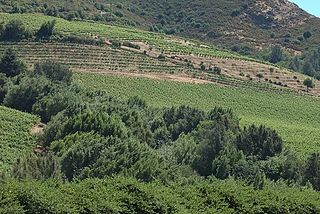
Moon Mountain District Sonoma County is an American Viticultural Area (AVA) within Sonoma Valley and North Coast viticultural areas, just north of the city of Sonoma. This mountainous region on the very eastern edge of Sonoma County has a historic reputation for producing rich, intensely-flavored wines from Cabernet Sauvignon and Syrah varietals since the 1880s. The District was established on November 1, 2013, by the Alcohol and Tobacco Tax and Trade Bureau (TTB). Its designation covers 17,663 acres (28 sq mi) of land stretching north-south along the western slopes of the Mayacamas mountains between Sugarloaf Ridge State Park and Los Carneros viticultural area with the Napa Valley’s Mount Veeder viticultural area outlining the eastern slopes. Its name is derived from Moon Mountain Road, which traverses through the area and itself a reference to Sonoma, which means 'valley of the moon' in the local Native American dialect. A clear view to San Francisco 50 miles (80 km) south is not uncommon from Moon Mountain District vineyards.
References
- ↑ "§ 9.102 Sonoma Mountain" (Title 27: Alcohol, Tobacco and Firearms; Part 9— American Viticultural Areas; Subpart C— Approved American Viticultural Areas). Code of Federal Regulations (e-CFR). Retrieved January 4, 2008.
- 1 2 "Sonoma Mountain (AVA): Appellation Description". Appellation America. 2007. Archived from the original on February 11, 2009. Retrieved January 4, 2008.
38°21′36″N122°33′22″W / 38.36000°N 122.55611°W